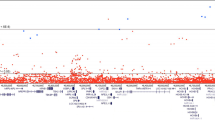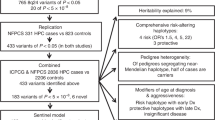Abstract
Inherited susceptibility to prostate cancer has been linked to a number of chromosomal regions, however no genes have been unequivocally shown to underlie reported linkages. The putative gene localised to chromosome 1q42–q43, has been designated PCaP. We have recently shown that germline mutations in the fumarate hydratase (FH) gene located on 1q43 cause smooth muscle tumours and renal cell carcinoma. It is conceivable that germline FH mutations might confer an increased risk of prostate cancer and underlie linkage of prostate cancer to PCaP. To examine this proposition we have analysed the entire coding region of FH in 160 prostate cancer cases in 77 multiple case families. No pathogenic mutations in FH were identified in any of the cases. This data makes it highly unlikely that mutations in FH confer susceptibility to prostate cancer.
This is a preview of subscription content, access via your institution
Access options
Subscribe to this journal
Receive 4 print issues and online access
$259.00 per year
only $64.75 per issue
Buy this article
- Purchase on Springer Link
- Instant access to full article PDF
Prices may be subject to local taxes which are calculated during checkout
Similar content being viewed by others
References
Majeed A, Babb P, Jones J, Quinn M . Trends in prostate cancer incidence, mortality and survival in England and Wales 1971–1998. BJU Int 2000; 85: 1058–1062.
Schulman CC, Zlotta AR, Denis L, Schroder FH, Sakr WA . Prevention of prostate cancer. Scand J Urol Nephrol 2000; 205 (Suppl): 50–61.
Carter BS, Beaty TH, Steinberg GD, Childs B, Walsh PC . Mendelian inheritance of familial prostate cancer. Proc Natl Acad Sci USA 1992; 89: 3367–3371.
Peto J, Houlston RS . Genetics and the common cancers. Eur J Cancer 2001; 37 (Suppl 8): S88–S96.
Gronberg H, Damber L, Damber J, Iselius L . Segregation analysis of prostate cancer in Sweden: support for dominant inheritance. Am J Epidemo 1997; 146: 552–557.
Schaid DJ, McDonnell SK, Blute ML, Thibodeau SN . Evidence for autosomal dominant inheritance of prostate cancer. Am J Hum Genet 1998; 62: 1425–1438.
Cui J, Staples MP, Hopper JL, English DR, McCredie MR, Giles GG . Segregation analyses of 1476 population-based Australian families affected by prostate cancer. Am J Hum Genet 2001; 68: 1207–1218.
Smith JR, et al. Major susceptibility locus for prostate cancer on chromosome 1 suggested by a genome-wide search. Science 1996; 274: 1371–1374.
Valeri E, et al. Genetic analysis of familial prostatic cancer: localisation of a gene predisposing to prostate cancer (PcaP) on chromosome 1q42.2–43. Prog Urol 1999; 9: 680–688.
Xu J, et al. Evidence for a prostate cancer susceptibility locus on the X chromosome. Nature Genet 1998; 20: 175–179.
Gibbs M, et al. Evidence for a rare prostate cancer-susceptibility locus at chromosome 1p36. Am J Hum Genet 1999; 64: 776–787.
Bock CH, et al. Analysis of the prostate cancer-susceptibility locus HPC20 in 172 families affected by prostate cancer. Am J Hum Genet 2001; 68: 795–801.
Tavtigian SV, et al. A candidate prostate cancer susceptibility gene at chromosome 17p. Nature Genet 2001; 27: 172–180.
Eagle LR, Yin X, Brothman AR, Williams BJ, Atkin NB, Prochownik EV . Mutation of the MXI1 gene in prostate cancer. Nature Genetics 2002; 30: 406–410.
Cancel-Tassin G, Latil A, Valeri A, Mangin P, Fournier G, Berthon P, Cussenot O . PCAP is the major known prostate cancer predisposing locus in families from south and west Europe. Eur J Hum Genet 2001; 9: 135–142.
Tomlinson A, et al. Germline mutations in FH predispose to dominantly inherited uterine fibroids, skin leiomyomata and papillary renal cell cancer. Nature Genet 2002; 30: 406–410.
Ganguly A, Rock M, Prockop D . Conformation sensitive gel electrophoresis for rapid detection of single-base differences in double stranded PCR products and DNA fragments: evidence for solvent induced bends in DNA heteroduplexes. Proc Natl Acad Sci USA 1993; 90: 10325–10329.
Acknowledgements
We are grateful to the families for their participation. This work was supported by the Prostate Cancer Charitable Trust, Prostate Research Campaign UK, The Times Christmas Appeal, Institute of Cancer Research, Cancer Research UK, formerly The Cancer Research Campaign UK (Grants SP2304/0201 and SP2304/0301) and a legacy from the estate of Marion Silcock. DNA sequencing was conducted in the Jean Rook Gene Cloning Laboratory, supported by BREAKTHROUGH Breast Cancer.
Author information
Authors and Affiliations
Consortia
Corresponding author
Rights and permissions
About this article
Cite this article
Bevan, S., Edwards, S., Ardern Jones, A. et al. Germline mutations in fumarate hydratase (FH) do not predispose to prostate cancer. Prostate Cancer Prostatic Dis 6, 12–14 (2003). https://doi.org/10.1038/sj.pcan.4500616
Received:
Accepted:
Published:
Issue Date:
DOI: https://doi.org/10.1038/sj.pcan.4500616
Keywords
This article is cited by
-
Hereditary leiomyomatosis and renal cell cancer: update on clinical and molecular characteristics
Familial Cancer (2011)
-
No germline FH mutations in familial breast cancer patients
European Journal of Human Genetics (2005)
-
Searching for the hereditary causes of renal-cell carcinoma
Nature Reviews Cancer (2004)



